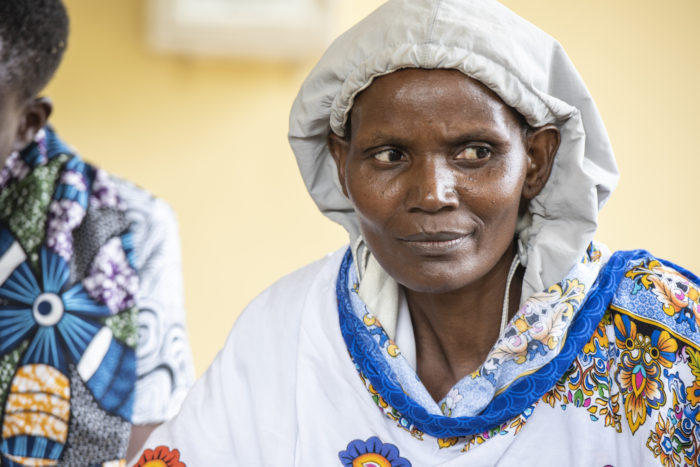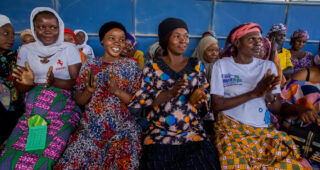“We Have Become Free People”
Note: The interactions portrayed in the photos and video for this story predate the advent of the COVID-19 pandemic in Tanzania. Today, all activities at the Kibosho Hospital follow social distancing protocols.
It is a sunny day at Kibosho Hospital in the Kilimanjaro region of Tanzania, and a group of mothers gather on a patio of the local hospital for an HIV mother support group, enjoying the fresh air as they sit and talk.
Most of the sessions are facilitated by a nurse at the hospital who educates the women on HIV-related topics, but today’s session is led by one of the founding members of the group, a fellow mother named Rose.
 “You all know we are mothers that are HIV-positive,” says Rose. “We were also distressed. Some even gave up trying to have a baby because you had been diagnosed with HIV.” The women nod. Rose herself had vowed off bearing children after receiving her HIV diagnosis.
“You all know we are mothers that are HIV-positive,” says Rose. “We were also distressed. Some even gave up trying to have a baby because you had been diagnosed with HIV.” The women nod. Rose herself had vowed off bearing children after receiving her HIV diagnosis.
“But after being educated by our healthcare workers, our nurses, we learned that bearing a child doesn’t have to mean bearing a child who is HIV-positive.”
Rose now has four heathy, HIV-free children, including her son Joel, who plays with the other children of the group as the women talk.
The women then reviewed the key steps to having an HIV-free child: adhering to medication, attending all health facility appointments, administering treatment to their children, and knowing when to and when not to breastfeed to ensure the children have a strong immune system.
Fighting Stigma
It is important to discuss this specific medical knowledge, as stigma based in misinformation is one of the greatest barriers to healthcare.
 “When we all first met, most of us were worried, depressed. Some were living in fear,” says Rose. “You may find one to have stigmatized herself, in a sense.”
“When we all first met, most of us were worried, depressed. Some were living in fear,” says Rose. “You may find one to have stigmatized herself, in a sense.”
This self-stigmatization, as Rose describes it, brings shame and hopelessness, leading people to default on their medication, either because they believe that that an HIV diagnosis is a death sentence, or they may be hiding their diagnosis in order to avoid discrimination from others.
Rose offers the group a different reality.
“If you continue to stigmatize yourself, you will fall sick and your children will suffer,” Rose says. “But if you continue adhering to this drug, it suppresses the virus accordingly. You will live well; you will take good care of your family; and your children will study up to university while you are still alive.”
If taken properly, antiretrovirals can reduce the prevalence of the virus such that it is undetectable, at which point there is no threat of transmitting the virus to others. People successfully managing their HIV can expect to live a healthy, normal life.
One member of the group provides testimony, of both how hesitant she had been to adhere to her medication, and of how much better she felt when she took her medication regularly. The group celebrated her, and shared other experiences and tips for staying motivated to take their drugs.
“We are given enough knowledge, the knowledge to get rid of the stigma, finally we have invested in our health and we have become free people,” says another mother.
The Power of Sisterhood
For this group of women, this hospital patio has become a safe haven. While most of these mothers go through their daily lives hiding their diagnosis, they are able to come here and speak freely with their peers. They can discuss sensitive issues, such as disclosure, family planning, and navigating relationships.
 This space was made possible by committed and welcoming hospital staff. Another founding member of the group, Fidelis, shares how she expected to be discriminated against, even at the hospital.
This space was made possible by committed and welcoming hospital staff. Another founding member of the group, Fidelis, shares how she expected to be discriminated against, even at the hospital.
“I was convinced discrimination was there, and it was bad, but I was prepared and I never lost hope. And yet the doctors at Kibosho love me so much.”
Rose agrees. “Our sister, Nurse Bernadetha, educated us on being good followers of our medication, getting our health tested frequently, breastfeeding and family planning. In this group we are given encouragement and are made sure that we meet on every second Saturday without giving up.”
As the group grew, and as the mothers learned more about living healthily with HIV, solidarity expanded. For those not yet comfortable receiving formal services from the hospital, these women serve as intermediate counselors and champions in their communities.
I will keep on encouraging my fellows, those who are being stigmatized in the community, I will give them hope. I will tell them that having HIV does not mean that you won’t be able to have children. Rose, support group founder
“I have advised three women that lost hope of living,” recounted Fidelis. “I just went to their homes to visit them, like a good neighbor, and I advised them to go and get tested, as I have been living with HIV/AIDS for eleven years.”
“I will keep on encouraging my fellows, those who are being stigmatized in the community, I will give them hope.” says Rose. “I will tell them that having HIV does not mean that you won’t be able to have children.”
“This group has given me awareness and I practice what is taught to me. As a result, I am saved, and whenever I get my viral load tests, my HIV virus is undetectable!”

This group is just one out of 119 mother support groups benefiting from the USAID Boresha Afya North/Central Project implemented by EGPAF in partnership with EngenderHealth and the Ministry of Health, Community Development, Gender, Elderly, and Children (MOHCDGEC), the project seeks to increase access to quality, comprehensive, and integrated health services among women and youth in Tanzania’s six regions of Arusha, Dodoma, Kilimanjaro, Manyara, Singida, and Tabora.
Team EGPAF
Tanzania
Community Mobilization; General; Maternal & Child Health; Prevention of Mother-to-Child Transmission



